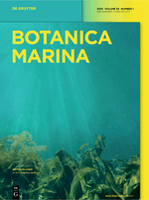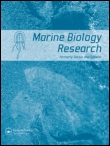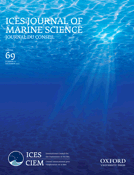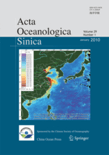
BOTANICA MARINA
Scope & Guideline
Fostering insights into the intricate web of marine life.
Introduction
Aims and Scopes
- Marine Algal Ecology:
Research on the ecological dynamics, distribution, and interactions of marine algae within various ecosystems, including coastal and open ocean environments. - Taxonomy and Systematics of Marine Plants:
In-depth studies focusing on the identification, classification, and phylogenetic relationships of marine algae, contributing to the understanding of biodiversity. - Aquaculture and Utilization of Macroalgae:
Exploration of sustainable practices in the cultivation of macroalgae, including their potential uses in food, pharmaceuticals, and biofuels. - Environmental Impacts on Marine Flora:
Investigations into how environmental factors, such as climate change, pollution, and invasive species, affect marine plant communities and their ecosystems. - Chemical Ecology and Bioactivity:
Studies on the chemical properties of marine plants and their interactions with other organisms, including bioactive compounds and their potential applications.
Trending and Emerging
- Climate Change and Marine Ecosystems:
Increasing publications are addressing the effects of climate change on marine flora, highlighting the need for adaptive management strategies for marine ecosystems. - Invasive Species and Biodiversity:
Research on the impacts of invasive algae on native biodiversity is trending, reflecting growing concerns over ecological balance and conservation efforts. - Aquaculture Innovations:
There is a rising interest in the potential of macroalgae in aquaculture, including studies on cultivation techniques and the economic viability of seaweed farming. - Ecophysiological Responses to Environmental Stressors:
Emerging studies focus on how marine plants respond to various environmental stressors, including temperature, salinity, and nutrient availability, which are crucial for understanding resilience. - Genetic and Molecular Studies:
An increase in genetic and molecular analyses is evident, enabling more accurate assessments of species diversity and evolutionary relationships among marine plants.
Declining or Waning
- Traditional Marine Mycology:
Research focusing on marine fungi has decreased, possibly due to a shift towards more impactful studies on macroalgae and their ecological roles. - Historical Phytogeography Studies:
Studies that focus solely on historical distributions of marine flora appear to be waning, as newer research emphasizes contemporary ecological interactions and climate impacts. - Morphological Studies Without Molecular Techniques:
There is a noticeable decline in purely morphological studies of marine plants, as advances in molecular techniques have become the preferred method for taxonomic studies.
Similar Journals

Marine Biology Research
Advancing marine science for a sustainable future.Marine Biology Research is a premier journal published by Taylor & Francis, focusing on the dynamic field of marine biology and its intersecting realms of aquatic science, ecology, and oceanography. Since its inception in 2005, this journal has served as a crucial platform for researchers and professionals to disseminate their findings, with a vision extending to 2024 and beyond. The journal is recognized with a Q3 quartile ranking in both Aquatic Science and Ecology, Evolution, Behavior and Systematics, underscoring its growing influence in these fields as evidenced by its Scopus rankings. Located in the United Kingdom, Marine Biology Research aims to foster collaboration and innovation through open access options, facilitating knowledge exchange among the academic community. With a steady commitment to advancing marine sciences, this journal is an invaluable resource for those dedicated to understanding and preserving our ocean ecosystems.

ICES JOURNAL OF MARINE SCIENCE
Unveiling the Mysteries of Ocean EcosystemsThe ICES Journal of Marine Science, published by Oxford University Press, stands at the forefront of marine research, offering cutting-edge insights into aquatic sciences and oceanography since its inception in 1903. With its ISSN 1054-3139 and E-ISSN 1095-9289, this esteemed journal has garnered a reputation for excellence, evidenced by its Q1 rankings in categories such as Aquatic Science, Ecology, and Oceanography as of 2023. The journal's commitment to advancing knowledge in marine systems makes it an essential resource for researchers, professionals, and students alike, who are keen to explore the intricate ecosystems that sustain our planet. Without an open access model, the journal maintains a rigorous editorial standard and is recognized among the top journals, ranking impressively in various Scopus categories. Authored contributions reflect pioneering research that informs policy and fosters sustainable practices, making this journal a critical platform for disseminating marine science knowledge.

VIE ET MILIEU-LIFE AND ENVIRONMENT
Innovating Solutions for Aquatic Ecosystem ChallengesVIE ET MILIEU - LIFE AND ENVIRONMENT is a pivotal journal in the realms of aquatic science and ecology, serving as a vital platform for researchers and professionals interested in the interconnections between living organisms and their environments. Published by the esteemed OBSERVATOIRE OCEANOLOGIQUE BANYULS in France, this journal has been disseminating valuable research since its inception in 1980, with volumes covering various topics pertinent to environmental dynamics through to 2024. Despite its current classification in the Q4 quartile for both aquatic science and ecology, the journal offers a unique opportunity for scholars to contribute to niche areas often overlooked by more prominent publications. VIE ET MILIEU is committed to fostering a comprehensive understanding of ecological interactions and the conservation of aquatic ecosystems, making it an essential resource for those engaged in environmental science and biology. Researchers can access a wealth of knowledge that supports their work, encourages collaboration, and inspires innovative approaches to pressing ecological issues.

MARINE AND FRESHWATER RESEARCH
Diving into the dynamics of ecosystems.Marine and Freshwater Research is a prestigious journal published by CSIRO PUBLISHING that serves as a key platform for the dissemination of cutting-edge research in the fields of Aquatic Science, Ecology, and Oceanography. With an impactful presence since its inception in 1948, the journal provides critical insights into the dynamics of freshwater and marine ecosystems, promoting interdisciplinary approaches that contribute to our understanding of biodiversity and sustainability. Currently ranked in the Q2 category across major scientific domains, including Ecology and Aquatic Science, it enjoys a robust academic reputation supported by impressive Scopus rankings, such as Rank #66/247 in Aquatic Science and Rank #44/145 in Oceanography, reflecting its high citation impact and relevance. While offering a subscription-based access model, the journal remains dedicated to fostering dialogue and innovation within the scientific community, aiming to bridge the gap between research findings and practical applications in environmental management. Located in Australia, Marine and Freshwater Research is an essential resource for researchers, professionals, and students dedicated to exploring the complexities of aquatic ecosystems and advocating for their preservation.

REVMAR-Revista Ciencias Marinas y Costeras
Innovating solutions for aquatic ecosystems.REVMAR-Revista Ciencias Marinas y Costeras is an esteemed open-access journal published by the Universidad Nacional, Facultad de Ciencias Exactas y Naturales in Costa Rica. Since its establishment, it has focused on disseminating high-quality research in the fields of Marine and Coastal Sciences, contributing significantly to the understanding of aquatic ecosystems and their conservation. With a commitment to academic excellence, the journal has been continuously accessible since 2009, allowing researchers from around the globe to share findings without barriers. Although it holds a Q4 ranking in several key categories including Animal Science, Aquatic Science, and Ecology, the journal provides a vital platform for scholars at all stages of their careers to contribute to important dialogues surrounding marine biodiversity and environmental sustainability. As it enters a period of convergence from 2019 to 2024, REVMAR aims to enhance its visibility and impact within the scientific community while maintaining a focus on innovative research that addresses pressing ecological challenges faced by marine and coastal environments.

Annual Review of Marine Science
Fostering academic discourse for the ocean's future.The Annual Review of Marine Science is a leading academic journal published by Annual Reviews, dedicated to advancing the field of marine science through comprehensive and insightful reviews. With an ISSN of 1941-1405 and E-ISSN 1941-0611, this esteemed journal has established itself as a critical resource for researchers, professionals, and students alike. Recognized for its exceptional quality, it holds a prestigious Q1 ranking in Oceanography for 2023, ranking first out of 145 journals in the Earth and Planetary Sciences category, placing it within the top 1% of its field. The Annual Review of Marine Science covers an expansive scope, incorporating cutting-edge research that spans the biological, chemical, and physical realms of marine studies. It fosters an environment of knowledge sharing and academic discourse, thereby augmenting the understanding of marine ecosystems and their global significance. While the journal is not open access, it ensures that the latest advancements and reviews are made available to a broad audience, reflecting the importance of marine science in addressing pressing environmental challenges. With its dedicated editorial team and commitment to scholarly rigor, the journal is an indispensable platform for advancing marine research and education from its base in the United States.

THALASSAS
Connecting Researchers to the Heart of Aquatic ScienceTHALASSAS is a prominent academic journal specializing in the fields of Aquatic Science and Oceanography, published by Springer International Publishing AG. Established in 2005 and running through 2024, this journal serves as a vital platform for sharing groundbreaking research and innovative findings related to the marine environment and its ecosystems. With an ISSN of 0212-5919 and an E-ISSN of 2366-1674, THALASSAS is indexed in Scopus and currently holds a Q3 classification in both Aquatic Science and Oceanography for 2023, reflecting its relevance and contribution to these scientific disciplines. Although it does not follow an Open Access model, THALASSAS offers valuable insights for researchers, professionals, and students interested in sustainable ocean management and aquatic biodiversity. Its rigorous peer-review process ensures that published articles meet the highest standards of academic quality, fostering a deeper understanding of marine sciences and addressing critical issues facing aquatic systems today.

ACTA OCEANOLOGICA SINICA
Innovating Insights into Aquatic EcosystemsACTA OCEANOLOGICA SINICA, published by SPRINGER, stands as a significant voice in the fields of Aquatic Science and Oceanography, contributing vital research and insights since its inception in 1985. With an ISSN of 0253-505X and an E-ISSN of 1869-1099, this journal maintains a strong international focus, delivering high-quality peer-reviewed articles that address pressing marine and freshwater environmental issues. Although it operates under a subscription model, its Q3 ranking in both Aquatic Science and Oceanography demonstrates its solid standing within Scopus, placing it in the 48th and 44th percentiles respectively. The journal aims to foster knowledge exchange and collaboration among researchers, professionals, and students by providing a platform for innovative studies and comprehensive reviews. With a dedicated editorial board and a commitment to advancing scientific understanding, ACTA OCEANOLOGICA SINICA serves as an essential resource for anyone engaged in the study of oceanographic phenomena and aquatic ecosystems.

Ocean Science Journal
Innovating Solutions for Oceanic ChallengesOcean Science Journal, published by the Korea Institute of Ocean Science and Technology (KIOST), is a pivotal resource for scholars and practitioners in the field of oceanography. With the ISSN 1738-5261 and E-ISSN 2005-7172, this journal presents cutting-edge research from 2006 to 2024, bridging fundamental and applied ocean sciences. Based in South Korea, with its headquarters located in Busan, the journal has achieved a commendable Scopus rank of #72 out of 145 in the domain of Earth and Planetary Sciences, placing it in the 50th percentile among peer publications. Classified in the Q3 category of the 2023 Oceanography rankings, Ocean Science Journal offers a platform for innovative studies that advance understanding of marine environments and promote sustainable ocean practices. While it does not operate under an open access model, readers and contributors can expect high-quality, peer-reviewed material that addresses pressing oceanic challenges and developments. This journal serves as an essential tool for researchers, professionals, and students committed to fostering marine science and ocean technology.

Ocean and Coastal Research
Innovating research for thriving coastal communities.Ocean and Coastal Research, published by the Institute Oceanográfico of the University of São Paulo, is an essential academic journal dedicated to advancing the fields of Aquatic Science, Oceanography, and Water Science and Technology. Established in 2020, the journal has quickly become a noteworthy platform contributing to the understanding and sustainable management of marine and coastal ecosystems, with an open access model that promotes the dissemination of critical research findings. Although currently categorized in the fourth quartile across its respective fields in 2023, the journal serves as an emerging repository of valuable insights for researchers, professionals, and students alike, aiming to make impactful discoveries that address contemporary challenges in ocean conservation and resource management. The journal's editorial team is committed to fostering interdisciplinary collaboration and upholding rigorous peer-review standards, thereby ensuring high-quality contributions that reflect the dynamic nature of marine science. With an E-ISSN of 2675-2824, all access to published articles is freely available, supporting global research efforts addressing crucial environmental issues.